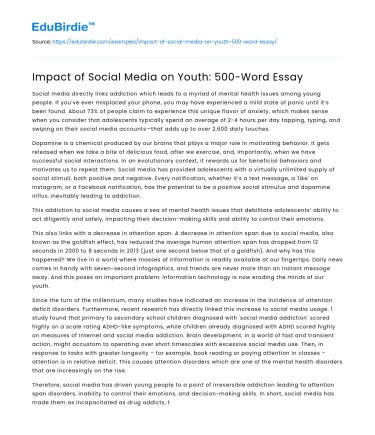Social media directly links addiction which leads to a myriad of mental health issues among young people. If you’ve ever misplaced your phone, you may have experienced a mild state of panic until it’s been found. About 73% of people claim to experience this unique flavor of anxiety, which makes sense when you consider that adolescents typically spend an average of 2-4 hours per day tapping, typing, and swiping on their social media accounts—that adds up to over 2,600 daily touches.
Dopamine is a chemical produced by our brains that plays a major role in motivating behavior. It gets released when we take a bite of delicious food, after we exercise, and, importantly, when we have successful social interactions. In an evolutionary context, it rewards us for beneficial behaviors and motivates us to repeat them. Social media has provided adolescents with a virtually unlimited supply of social stimuli, both positive and negative. Every notification, whether it’s a text message, a 'like' on Instagram, or a Facebook notification, has the potential to be a positive social stimulus and dopamine influx, inevitably leading to addiction.
Save your time!
We can take care of your essay
- Proper editing and formatting
- Free revision, title page, and bibliography
- Flexible prices and money-back guarantee
This addiction to social media causes a sea of mental health issues that debilitate adolescents’ ability to act diligently and safely, impacting their decision-making skills and ability to control their emotions.
This also links with a decrease in attention span. A decrease in attention span due to social media, also known as the goldfish effect, has reduced the average human attention span has dropped from 12 seconds in 2000 to 8 seconds in 2013 (just one second below that of a goldfish). And why has this happened? We live in a world where masses of information is readily available at our fingertips. Daily news comes in handy with seven-second infographics, and friends are never more than an instant message away. And this poses an important problem: information technology is now eroding the minds of our youth.
Since the turn of the millennium, many studies have indicated an increase in the incidence of attention deficit disorders. Furthermore, recent research has directly linked this increase to social media usage. 1 study found that primary to secondary school children diagnosed with 'social media addiction' scored highly on a scale rating ADHD-like symptoms, while children already diagnosed with ADHD scored highly on measures of Internet and social media addiction. Brain development, in a world of fast and transient action, might accustom to operating over short timescales with excessive social media use. Then, in response to tasks with greater longevity – for example, book reading or paying attention in classes – attention is in relative deficit. This causes attention disorders which are one of the mental health disorders that are increasingly on the rise.
Therefore, social media has driven young people to a point of irreversible addiction leading to attention span disorders, inability to control their emotions, and decision-making skills. In short, social media has made them as incapacitated as drug addicts, the type of people we would never want to end up as.






 Stuck on your essay?
Stuck on your essay?

